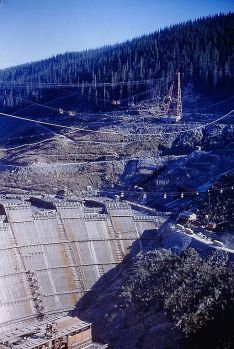Engineer/Construction Manager: Difference between revisions
Rmanwaring (talk | contribs) No edit summary |
No edit summary |
||
| (5 intermediate revisions by 3 users not shown) | |||
| Line 11: | Line 11: | ||
<!-- Add picture caption --> | <!-- Add picture caption --> | ||
|caption= Construction of the Hungry Horse Dam in Montana. | |caption= Construction of the Hungry Horse Dam in Montana. | ||
(Image Source: [https://commons.wikimedia.org/wiki/File:Hungry_Horse_Dam_under_construction_2_-_9-15-1951.jpg Wikimedia]) | |||
}} | }} | ||
<!-- Introductory paragraph or topic page summary --> | <!-- Introductory paragraph or topic page summary --> | ||
" | "[[Construction]] engineers need to be aware of design philosophies and assumptions as to site conditions and function of project structures, and must understand the designers' intent concerning special technical provisions in the [[specifications]]. Identified preconstruction activities should include the orientation of construction engineers to the site specificity of the design and to the close communication requirements with all concerned [[engineering]] disciplines during the construction process. For major projects, there should be periodic meetings between design and construction engineers to discuss upcoming construction activities. Also, during the initial stages of important construction activities, the construction engineers should request site inspection by the design engineers to assure construction procedures are in accordance with design requirements." <ref name="FGDS">[[Federal Guidelines for Dam Safety (FEMA P-93) | Federal Guidelines for Dam Safety (FEMA P-93), FEMA, 2004]]</ref> | ||
"The design | "The programs should include frequent and mandatory [[inspections]] during construction to confirm that site conditions conform to those assumed for design or to determine if design changes may be required to suit the actual conditions. A major requirement is inspection and approval of the dam foundation and foundation treatment before placing of dam materials. Final design inspection of the construction should include complete project surveillance and testing of operating equipment."<ref name="FGDS"/> | ||
== | ==Best Practices Resources== | ||
{{Document Icon}} [[Federal Guidelines for Dam Safety | Federal Guidelines for Dam Safety, FEMA | {{Document Icon}} [[Federal Guidelines for Dam Safety (FEMA P-93) | Federal Guidelines for Dam Safety (FEMA P-93), FEMA]] | ||
==Trainings== | |||
{{Video Icon}} [[On-Demand Webinar: Fundamentals of Concrete Construction Inspections for Dams and Appurtenant Structures]] | |||
{{Video Icon}} [[On-Demand Webinar: Managing Increased Dam Safety Risk During Reconstruction]] | |||
{{Video Icon}} [[On-Demand Webinar: Quality Assurance and Field Inspection for Dam Construction Projects]] | |||
<!-- In the location of an in text citation, simply enclose the citation as follows: <ref> citation </ref>. Citations will automatically populate. Learn more at https://www.mediawiki.org/wiki/Help:Cite.--> | <!-- In the location of an in text citation, simply enclose the citation as follows: <ref> citation </ref>. Citations will automatically populate. Learn more at https://www.mediawiki.org/wiki/Help:Cite.--> | ||
Latest revision as of 15:33, 21 July 2023

|
| Construction of the Hungry Horse Dam in Montana.
(Image Source: Wikimedia) |
"Construction engineers need to be aware of design philosophies and assumptions as to site conditions and function of project structures, and must understand the designers' intent concerning special technical provisions in the specifications. Identified preconstruction activities should include the orientation of construction engineers to the site specificity of the design and to the close communication requirements with all concerned engineering disciplines during the construction process. For major projects, there should be periodic meetings between design and construction engineers to discuss upcoming construction activities. Also, during the initial stages of important construction activities, the construction engineers should request site inspection by the design engineers to assure construction procedures are in accordance with design requirements." [1]
"The programs should include frequent and mandatory inspections during construction to confirm that site conditions conform to those assumed for design or to determine if design changes may be required to suit the actual conditions. A major requirement is inspection and approval of the dam foundation and foundation treatment before placing of dam materials. Final design inspection of the construction should include complete project surveillance and testing of operating equipment."[1]
Best Practices Resources
![]() Federal Guidelines for Dam Safety (FEMA P-93), FEMA
Federal Guidelines for Dam Safety (FEMA P-93), FEMA
Trainings
![]() On-Demand Webinar: Managing Increased Dam Safety Risk During Reconstruction
On-Demand Webinar: Managing Increased Dam Safety Risk During Reconstruction
![]() On-Demand Webinar: Quality Assurance and Field Inspection for Dam Construction Projects
On-Demand Webinar: Quality Assurance and Field Inspection for Dam Construction Projects
Citations:
Revision ID: 7383
Revision Date: 07/21/2023
